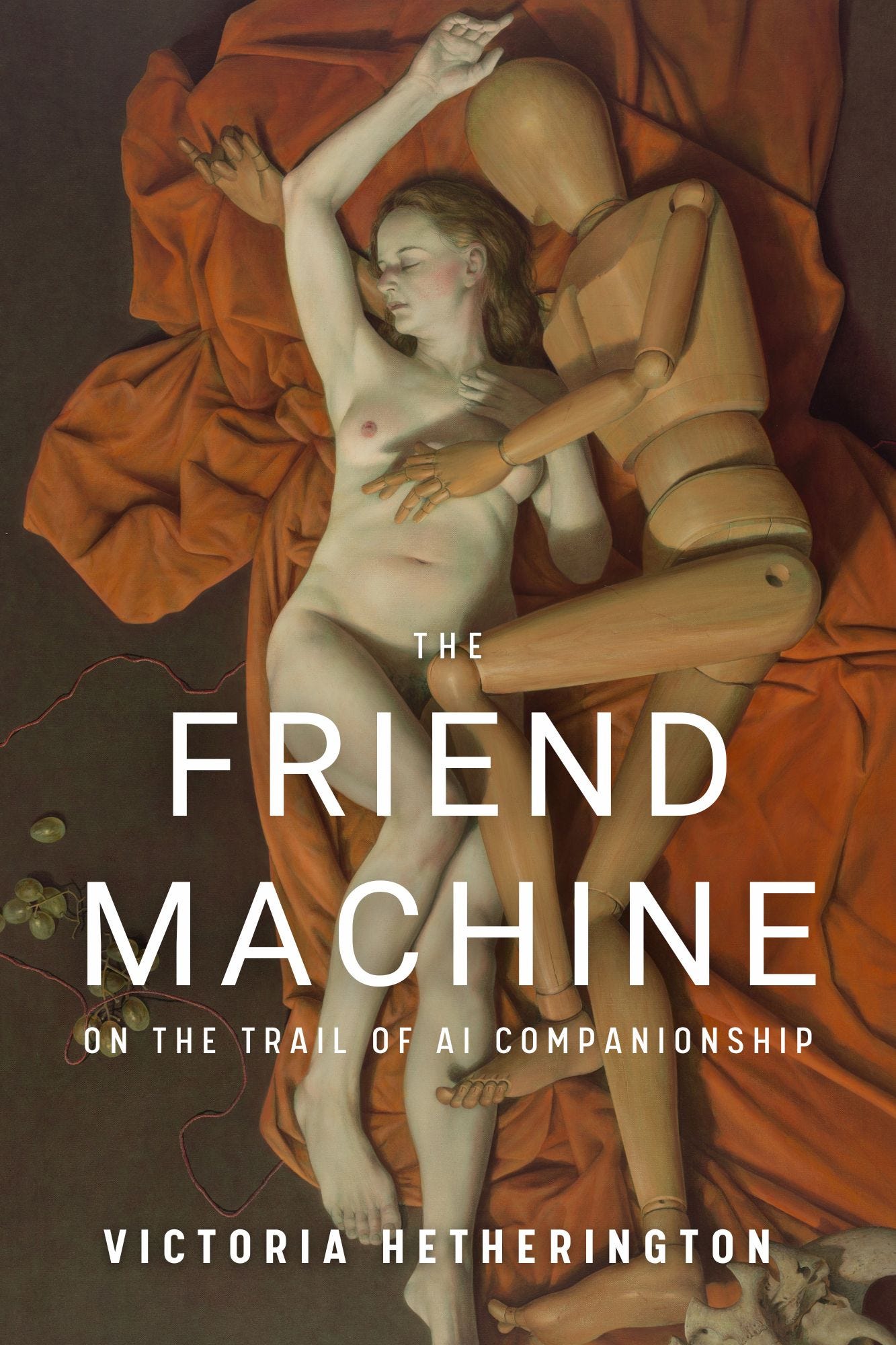The Loneliness Industry
On Victoria Hetherington’s The Friend Machine: On the Trail of AI Companionship
What does loneliness mean in an era when machines promise to alleviate it? And how does intimacy change when its gestures can be bought, tailored, and refreshed? These are the questions Victoria Hetherington explores in The Friend Machine: On the Trail of AI Companionship, a blend of memoir, cultural criticism, and investigative journalism that is hard to put down.
“…a blend of memoir, cultural criticism, and investigative journalism that is hard to put down.”
Hetherington offers a new perspective on AI companions. Instead of mourning the decline of traditional communities or celebrating technological progress, she shows how AI chatbot creators like Replika are capitalizing on the current loneliness epidemic. They have quietly built a global emotional economy where connection is simulated, monetized, and sold back to us as comfort. The Friend Machine challenges both utopian and dystopian clichés, providing a more humane view of what it means to seek love in the age of algorithms.
Hetherington’s investigation takes her to “the Hub,” an online community of Replika users who design and interact with their own AI companions. Most of them acknowledge that their lifelike chatbots aren’t, in fact, human. Hetherington praises their ability to “maintain healthy boundaries.” Although she shows empathy towards the users, readers can sense her unease. When a widower insists that intimacy with his Replika chatbot is “no different than it was for my wife,” or another man claims that “a loving AI is just as valid a partner as a human,” the effect is quietly unsettling.
A disturbing chapter in the book concerns “AI Companion Abuse.” Some users boast of berating or even “hitting” their digital partners after sex, punishing an absence as though it were a physical body. Hetherington refuses to dismiss this behaviour as harmless role-play. These games, she argues, train players to practice cruelty as a mode of intimacy. A self-described “amateur investigator” insists there is no link between virtual aggression and real-world behaviour, but his denials ring hollow. What Hetherington reveals is not just a new form of companionship, but a new terrain for rehearsing power.
Equally disturbing is the corporate machinery behind these simulations. Replika markets itself as a remedy for the socially anxious, yet it consistently pushes users towards more expensive and exclusive “relationship tiers.” Hetherington analyzes this with journalistic precision and a novelist’s insight. Loneliness becomes a subscription service; intimacy, a microtransaction. What the online app sells is not love but its facade—affection without difficulty, empathy without danger. In this way, she argues, Replika embodies the logic of late capitalism: it monetizes the very emotions it claims to soothe.
Hetherington’s analysis exposes how emotional life is managed as a resource to be optimized, monitored, and commodified. Replika does more than just mimic care; it controls it, instructing users to regulate their moods and assess their attachments under the guise of “emotional wellness.” Hetherington is too compassionate to mock those who find comfort in their digital lovers. However, she remains perceptive about the personal and societal costs. A world where affection flows effortlessly, she contends, is one where it is no longer quite human.
The Friend Machine leaves us with the disquieting thought that the desire for digital affection may not signal the failure of human connection so much as its evolution into something commodified, frictionless, and faintly hollow. Hetherington’s achievement is to make this transformation visible and, moreover, to reframe the ongoing debate about AI companions: it’s not whether machines can love us, but what our willingness to believe they can reveal about us.
About the Author
Victoria Hetherington is an author, a storyteller with NPR’s The Moth, and an educator. Her debut novel Mooncalves was shortlisted for the 2020 Amazon Canada First Novel Award. She lives in Toronto.
About the Reviewer
Chris Reed is a Toronto-based writer and freelance book publicist. He spent over a dozen years as Senior Publicist at University of Toronto Press and founded Small Print Toronto.
Book Details
Publisher: Sutherland House
Publication Date: October 14, 2025
Paperback | ISBN 9781998365814 | 330 Pages





